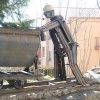von John Cheng

Gebundene Ausgabe: 384 Seiten
Verlag: Univ of Pennsylvania Pr (29. Februar 2012)
Sprache: Englisch
ISBN-10: 0812243838
ISBN-13: 978-0812243833
Pressestimmen
"Science fiction fans have long been the most avid aficionados in any arena of popular culture. Now with pioneering research and deep knowledge, John Cheng tells how thousands of Americans formed and sustained communities to pursue their visions of a future made better by science. Cheng's book chronicles a generation of young people inspired, engaged, and transformed by the possibilities of imaginary new worlds, ideas, and devices, so many of which inhabit our lives today. We live in a world they dreamed up, from space travel to cell phones, computers to nanotechnology. Cheng shows how readers and fans transformed science fiction from a marginal genre in the pulp magazine industry to a major cultural force."-Charles McGovern, College of William and Mary "John Cheng's highly readable book imaginatively shows the science fiction community's role in, and ways of, perceiving science. Cheng displays the ways in which readers incorporated science fiction into their lives, how this led them to think about science, and further still how some of them imagined aspects of that science into being. Displaying sure-handed use of challenging sources as well as deep knowledge of scientific as well as social theory, Astounding Wonder is cultural history at its best, and so much more."-Ian Gordon, author of Comic Strips and Consumer Culture
Kurzbeschreibung
When physicist Robert Goddard, whose career was inspired by H. G. Wells's War of the Worlds, published "A Method of Reaching Extreme Altitudes," the response was electric. Newspaper headlines across the country announced, "Modern Jules Verne Invents Rocket to Reach Moon," while people from around the world, including two World War I pilots, volunteered as pioneers in space exploration. Though premature (Goddard's rocket, alas, was only imagined), the episode demonstrated not only science's general popularity but also its intersection with interwar popular and commercial culture. In that intersection, the stories that inspired Goddard and others became a recognizable genre: science fiction. Astounding Wonder explores science fiction's emergence in the era's "pulps," colorful magazines that shouted from the newsstands, attracting an extraordinarily loyal and active audience. Pulps invited readers not only to read science fiction but also to participate in it, joining writers and editors in celebrating a collective wonder for and investment in the potential of science. But in conjuring fantastic machines, travel across time and space, unexplored worlds, and alien foes, science fiction offered more than rousing adventure and romance. It also assuaged contemporary concerns about nation, gender, race, authority, ability, and progress-about the place of ordinary individuals within modern science and society-in the process freeing readers to debate scientific theories and implications separate from such concerns. Readers similarly sought to establish their worth and place outside the pulps. Organizing clubs and conventions and producing their own magazines, some expanded science fiction's community and created a fan subculture separate from the professional pulp industry. Others formed societies to launch and experiment with rockets. From debating relativity and the use of slang in the future to printing purple fanzines and calculating the speed of spaceships, fans' enthusiastic industry revealed the tensions between popular science and modern science. Even as it inspired readers' imagination and activities, science fiction's participatory ethos sparked debates about amateurs and professionals that divided the worlds of science fiction in the 1930s and after.
Bearbeitet von Sierra, 21 April 2012 - 09:15.





